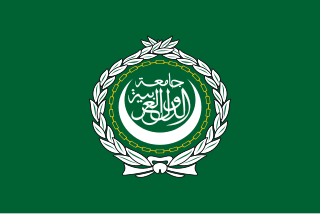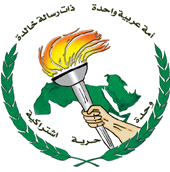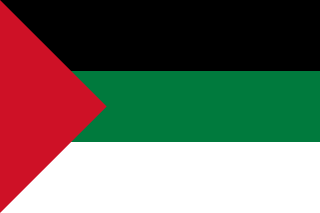Related Research Articles

The Arab League, formally the League of Arab States, is a regional organization in the Arab world, which is located in Northern Africa, Western Africa, Eastern Africa, and Western Asia. The Arab League was formed in Cairo on 22 March 1945 initially with six members: Egypt, Iraq, Transjordan, Lebanon, Saudi Arabia, and Syria. Yemen joined as a member on 5 May 1945. Currently, the League has 22 members, but Syria's participation has been suspended since November 2011.

The Emirate of Transjordan, officially known as the Amirate of Trans-Jordan, was a British protectorate established on 11 April 1921, which remained as such until achieving formal independence in 1946.

The Arab Scout Region also known as the Arab Scout Organization is the regional support centre of the World Scout Bureau of the World Organization of the Scout Movement, headquartered in Cairo, Egypt. By 1954, Scouting had become so popular in Arab countries that WOSM established the Arab Scout Region in Damascus.

Al-Zabadani or Az-Zabadani is a city and popular hill station in southwestern Syria in the Rif Dimashq Governorate, close to the border with Lebanon. It is located in the center of a green valley surrounded by high mountains at an elevation of around 1,100 m.

Syrian nationalism, also known as Pan-Syrian nationalism, refers to the nationalism of the region of Syria, or the Fertile Crescent as a cultural or political entity known as "Greater Syria". It should not be confused with the Arab nationalism that is the official state doctrine of the Syrian Arab Republic's ruling Arab Socialist Ba'ath Party, nor should it be assumed that Syrian nationalism necessarily propagates the interests of modern-day Syria or its government. Rather, it predates the existence of the modern Syrian state, and refers to the loosely defined Levantine region of Syria, known in Arabic as Ash-Shām.

The Franco-Syrian War took place during 1920 between the Hashemite rulers of the newly established Arab Kingdom of Syria and France. During a series of engagements, which climaxed in the Battle of Maysalun, French forces defeated the forces of the Hashemite monarch King Faisal, and his supporters, entering Damascus on July 24, 1920. A new pro-French government was declared in Syria on July 25, headed by 'Alaa al-Din al-Darubi and the region of Syria was eventually divided into several client states under the Mandate for Syria and the Lebanon. The British government, concerned for their position in the new mandate in Iraq, agreed to declare the fugitive Faisal as the new king of Iraq.

Bloudan is a Syrian village located 51 kilometers north-west of Damascus, in the Rif Dimashq Governorate; it has an altitude of about 1500 meters. In the 2004 census by the Central Bureau of Statistics it had a population of 3,101. The majority of the inhabitants are Greek Orthodox Christians, and a significant minority are Sunni Muslims and Protestants.

al-Zabadani District is a district of the Rif Dimashq Governorate in southern Syria. Administrative centre is the city of al-Zabadani. At the 2004 census, the district had a population of 63,780.

Muhammad Rafiq al-Tamimi was a Palestinian Arab educator and political figure in the 20th century. He was appointed to the Arab Higher Committee in 1945 and was the chairman of the Palestinian Arab paramilitary scout movement, al-Najjada (1945–47).

The Arab Kingdom of Syria was a self-proclaimed, unrecognized state that began as a "fully and absolutely independent... Arab constitutional government" announced on 5 October 1918 with the permission of the British military, gained de facto independence as an "Emirate" after the withdrawal of the British forces from OETA East on 26 November 1919, and was proclaimed as a Kingdom on 8 March 1920.

This is a survey of the postage stamps and postal history of Syria.
The Menarsha synagogue attack took place on 5 August 1949 in the Jewish quarter of Damascus, Syria. The grenade attack claimed 12 lives.
Abdul Rahman Hassan Azzam, also known as Azzam Pasha, was an Egyptian diplomat and politician. He was the first Secretary-General of the Arab League, from 22 March 1945 to September 1952.

The Second Syrian Republic—officially the Syrian Republic from 1950 to 1958 and the Syrian Arab Republic from 1961 to 1963—succeeded the First Syrian Republic that had become de facto independent in April 1946 from the French Mandate. The Second Republic was founded on the Syrian Constitution of 1950, which was suspended from 1953 to 1954 under Adib Shishakli's strongmanship, and later when Syria joined with the Republic of Egypt in forming the United Arab Republic in 1958. The Second Republic resumed when Syria withdrew from the union in 1961. In 1963, the Syrian Ba'athist Party came to power in a bloody military coup, which laid foundations for the political structure in Syria for the next decades.

The Arab Socialist Ba'ath Party, also referred to as the pro-Syrian Ba'ath movement, is a neo-Ba'athist political party with branches across the Arab world. The party emerged from a split in the Ba'ath Party in February 1966 and leads the government in Syria. From 1970 until 2000, the party was led by the Syrian president Hafez al-Assad. As of 2000, leadership has been shared between his son Bashar al-Assad and Abdullah al-Ahmar. The Syrian branch of the party is the largest organisation within the Syrian-led Ba'ath Party.

The Bloudan Conference of 1937 was the first pan-Arab summit held in Bloudan, Syria on 8 September 1937. The second Bloudan conference was held nine years later in 1946.

Arab nationalism is a nationalist ideology that asserts the Arabs are a nation and promotes the unity of Arab people, celebrating the glories of Arab civilization, the language and literature of the Arabs, and calling for rejuvenation and political union in the Arab world. Its central premise is that the people of the Arab world, from the Atlantic Ocean to the Indian Ocean, constitute one nation bound together by common ethnicity, language, culture, history, identity, geography and politics. One of the primary goals of Arab nationalism is the end of Western influence in the Arab world, seen as a "nemesis" of Arab strength, and the removal of those Arab governments considered to be dependent upon Western power. It rose to prominence with the weakening and defeat of the Ottoman Empire in the early 20th century and declined after the defeat of the Arab armies in the Six-Day War.

The historic region of Syria, in modern literature called Greater Syria, Syria-Palestine, or the Levant, is an area located east of the Mediterranean sea. The oldest attestation of the name Syria is from the 8th century BC in a bilingual inscription in Hieroglyphic Luwian and Phoenician. In this inscription the Luwian word Sura/i was translated to Phoenician ʔšr "Assyria." For Herodotus in the 5th century BC, Syria extended as far north as the Halys and as far south as Arabia and Egypt.

The Arab Higher Committee or the Higher National Committee was the central political organ of the Arab Palestinians in Mandatory Palestine. It was established on 25 April 1936, on the initiative of Haj Amin al-Husayni, the Grand Mufti of Jerusalem, and comprised the leaders of Palestinian Arab clans and political parties under the mufti's chairmanship. The Committee was outlawed by the British Mandatory administration in September 1937 after the assassination of a British official.
The Syrian Crisis of 1957 was a period of severe diplomatic confrontations during the Cold War that involved Syria and the Soviet Union on one hand, and the United States and its allies, including Turkey and the Baghdad Pact, on the other.